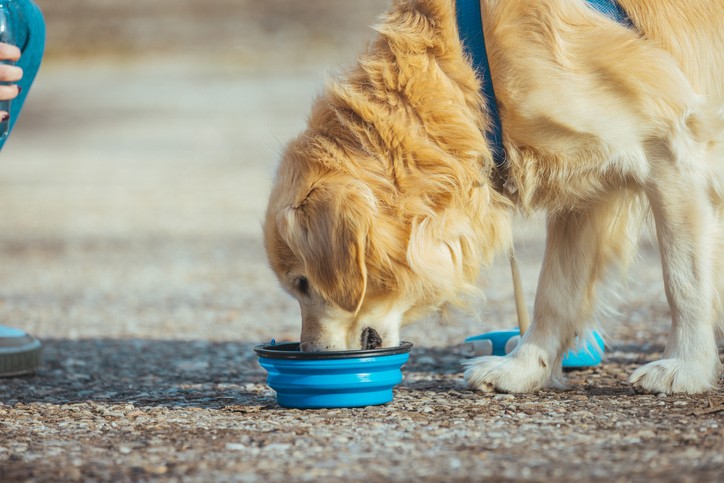
Dog Dehydration and How to Protect Your Pet
Do you know how to recognize signs of dehydration in dogs? Do you know what to do if your pet does become dehydrated? How dangerous is dehydration in dogs, anyway?
Dog dehydration can be very dangerous, especially if left untreated for longer than about a day. By learning the signs and symptoms of dehydration in your pet, you can choose when to manage the problem on your own and when to go to the vet, too. Read through the article below to learn more about protecting your pet from dehydration and responding to this condition appropriately.
Recognizing the Signs of Dehydration in Dogs
These are some signs dogs will show should they become dehydrated.
Vomiting
Vomiting is one of the earliest signs of dehydration in dogs. Unfortunately, vomiting also causes further dehydration, so it can be a dangerous symptom that leads to significantly worse problems in a short amount of time. If your dog is vomiting and not drinking any fluids, don’t wait to take them to the veterinarian.
Lethargy
Lethargy is a sign of many different problems in dogs, ranging from the mild to the very serious. On its own, lethargy may not indicate dehydration; however, coupled with other symptoms on this list, it is a good indicator that your dog isn’t getting enough liquid and needs to be treated.
Sunken Eyes
Sunken eyes occur in moderate to severe levels of dehydration. Your pet may have very dry-looking eyes at the same time as this symptom, too. If your dog’s eyes look sunken, it’s time to go to the emergency vet, as this is a sign that their body needs fluids quickly.
Dry Nose and Gums
If your dog’s gums and nose are briefly dry after playing outside on a hot day, this may not be anything to worry about. However, if the problem persists after about an hour, it can be an early warning sign of dehydration in your pet—especially along with other items on this list.
Treating Dog Dehydration
There are a few options to try at home, but it is best to talk with your veterinarian or visit the emergency vet if your dog becomes dehydrated.
Immediately Provide Liquids
If your dog is showing very mild signs of dehydration, you may be able to reverse the problem by giving them fresh, clean drinking water right away. Consider giving them other types of liquids too, such as chicken broth (with no garlic, onions, or salt), or pureed dog-safe fruits (like strawberries and blueberries).
Ice Cubes
Some dogs respond well to eating ice cubes instead of drinking bowls of water when they’re hot. Try giving your dog some small pieces of ice and see if they are interested in eating them for some extra hydration.
Go to the Emergency Vet
If your dog shows moderate to severe signs of dehydration, or if they are not interested in water or ice, take your pet to the emergency vet. Dehydration can quickly turn fatal, and it’s crucial for your dog to get IV fluids before reaching that point.
How to Prevent a Dog from Becoming Dehydrated
It is a serious situation should dog become dehydrated so preventing it from happening is the best option. Here are some simple tips:
Provide Fresh, Clean Drinking Water
Make sure your dog always has access to fresh, clean drinking water, even if you’re not at home for a while. It’s better to risk your pet going to the bathroom in the house than to risk your dog becoming badly dehydrated without access to any water.
Take Water with You on the Go
If you’re traveling with your dog even for a short time, make sure to bring them a bottle of water and a dish to drink out of, too. This way, they won’t run the risk of becoming mildly dehydrated before you can get back home to the water bowl. Don’t forget water for yourself as well!
Encourage Liquids Through Food
If your dog isn’t very interested in drinking water or doesn’t seem to drink enough throughout the day, consider adding some water to the dry food instead. You may also want to feed them wet food mixed into dry food to help get some much-needed hydration, too.
Clean your Dog’s Water Dish
Finally, make sure you regularly clean your dog’s water dish. Many dogs are uninterested in drinking from a dirty dish, and those that will drink dirty water may be at risk of getting sick from it. Keep up with cleaning out the dish every couple of days at least.
Talk with Boston Veterinary Clinic
If possible, it is always best to prevent your dog from suffering dehydration in the first place. However, there are some situations in which you can’t do anything about it yourself—such as when your dog is running a fever and vomiting. In these cases, you must learn how to recognize dehydration early and respond properly.
If you have any concerns about your pet’s dehydration or if the condition has lasted longer than a day, take your dog to the emergency vet. They may require IV fluids and will need to be treated for the underlying problem contributing to the dehydration, too.
If you have questions about dog dehydration in Boston, MA or would like to talk with a veterinarian, Boston Veterinary Clinic can help. Book an appointment online today!